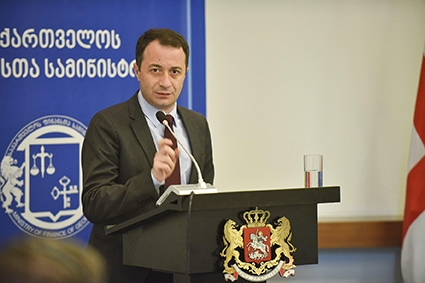Ministry: 2018-2019 Energy Projects to Bring More than $1 bln Investment
The Ministry of Economy of Georgia says the energy sector remains one of the highest growing and most investment-friendly sectors of the Georgian economy.
The ministry reports more than $201 million was invested in the construction of energy facilities in Georgia in 2018 – 2019 and 28 memoranda of understanding have already been signed on the construction of energy facilities in Georgia.
In April this year, negotiations were successfully completed on the Namakhvani Hydro Power Plant cascade in Georgia, with a planned investment of $750 million.
Deputy Minister of Economy and Sustainable Development of Georgia Davit Tvalabeishvili said that such projects are strategically important for Georgia's energy security, its continuous energy supply and reliability.
“There is great interest from both international and local investors in the construction of energy facilities in Georgia. First, consumption in the country is increasing by an average of 5% annually as a result of rising commercial and domestic demand. Investors are also interested in the ongoing liberalization of the electricity market, which will create a competitive electricity market,” he said.
Tvalabeishvili noted projects launched in Georgia's energy sector in 2018-2019 will bring more than a billion dollars of investment and added that the country needs new energy generation facilities, which will ensure Georgia's uninterrupted energy supply and further economic development of the country.
“The projected capacity of 11 hydroelectric plants in operation in 2018 - 2019 is 98 MW, and in the next two years 16 more small and medium hydro plants will be added to the country's energy sector, with installed capacity of 100 MW and estimated investment of $180 million,” he said, going on to emphasize the importance of the Namakhvani HPP cascade in particular, which will be one of the largest energy projects along with Nenskra since Georgia's independence.
“The HPP installed capacity will be 433 MW, as a result of which, after completion of construction, electricity generation in Georgia will increase by about 15%,” he said.
The Deputy Minister also focused on another major project that is important for the country's energy security: the 230 MW installed thermal power plant in Gardabani, which will be one of the largest power generators in the country once it becomes operational in 2020.
Georgia’s National Statistics Office says imports of electricity in the first half of this year amounted to $27 million 553 thousand, which is about $3 million less than last year's figure ($30 million 748 thousand).
Despite the decline in electricity imports in terms of money, it is noteworthy that according to the latest data from the Commercial Electricity Operator, electricity imports in June 2019 increased by 28.9%, and by 5.1% in the first half of the year. The electricity was mainly imported from Armenia, Russia and Azerbaijan.
Last month, Georgian National Energy and Communications Regulatory Commission (GNERC) Head Irina Milorava said that increased electricity import during the last years is a serious challenge because it means the country is dependent on import.
Milorava noted that in 2017 and 2018, the electricity import tripled in Georgia compared to 2016.
“It is a serious problem for our energy security because we depend on the energy of neighboring countries,” she said, noting that imported electricity amounted to 11% of Georgia’s resources but “the import in winter will definitely be increased, which means that in critical months, January, February and March, the import-dependency will increase to 25-30%.”
Earlier last month, Georgia’s Ministry of Economy and Sustainable Development stated the country cannot meet increased demand on electricity in the future if new power plants are not built. The ministry said building new HPPs will balance power consumption and generation.
To note, there are 93 operational power plants in Georgia with a total installed capacity of 4207.17 MW.
By Thea Morrison
Image source: IPN











